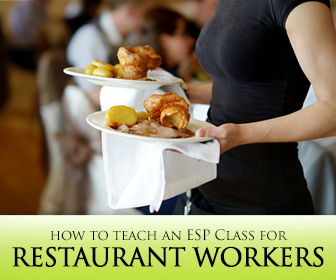Letís Get Together: 7 Print and Go Role Plays for Everyday Social Situations


If you find yourself preparing students to be on the opposite end the restaurant industry, here are some tips for teaching English for specific purposes for restaurant workers.

Experience is the best teacher; language learning included! Take your students to English-speaking restaurants to give them the experience and feel for what really happens in a restaurant. It’s fine if they end up working in a different style restaurant or even a different country; much of the language experience will be similar if not the same. Encourage students to make notes of unique or unfamiliar words or phrases they hear. Have them keep a journal to record their observations to reflect on and discuss later in class. Plus, what better way to teach than over food?
Many textbooks today use overly-formal and unrealistic dialogues to practice restaurant language. Make it clear to your students that their customers more than likely will not follow these patterns. As much as you are capable, teach the slang and commonly used expressions for the region they will be working in. For example, you might find this dialogue in a textbook:
Now, in some formal restaurants, your students may be expected to have such a level of formality, in which case it’s good to practice this kind of dialogue. However, if your students are working in a less formal environment, like a family-style restaurant or a fast food industry, you will want to prepare them for a dialogue more like this:
If your textbook has excessively formal language as in the first dialogue above, don’t be afraid to make your own materials or search for other materials more suitable for your students. As recommended above, take your students to the type of restaurant where they will be working to get some practice interacting with the server and hearing what kind of language they will be expected to use. Then, have your students create their own dialogues to practice in class. In an ESP class, keep the language as real as possible to create the most beneficial experience for your students.
What largely makes ESP different from English for academic purposes is that you can better predict which vocabulary your students will encounter most often, which is a huge benefit to you as a teacher! You can adjust the daily language you use in the classroom to match what they need, give more context to explain new vocabulary words, and focus on depth of vocabulary knowledge rather than breadth.
Make sure restaurant workers know the appropriate vocabulary:
A great activity to practice restaurant vocabulary, especially lower level vocabulary, is Taboo since it requires a lot of description. Often, restaurant workers are asked to describe what a food item is, so the better their description skills, the better employee they’ll be! Write down common restaurant vocabulary, and have students take turns describing the word in order to get their team to guess the appropriate word.
Since we are all language learners and language is never perfect, focus on setting realistic goals for your learners which is to understand and be understood. Practice is how we make that happen. Don’t worry about explaining all of the metalanguage that goes with grammar or sentence structure (what’s a noun clause and what the subject vs. predicate are in a sentence). Teach them chunks of language that can be replicable and manipulated based on the situation.
For example, teach them the structure “I’d like....” and you can show them:
Students in ESP classes don’t need to worry about how you use the infinitive after the structure “would like.” Just give them examples and let them use it until they feel comfortable.
In order to practice the grammar structure and the vocabulary scenarios listed above, use role plays to help your students get as authentic as possible practice before entering the field. When students feel comfortable with the structures and vocabulary, split them into pairs and give them each a context, for example, a server and an angry customer whose order was incorrect. Allow the students a few minutes to prepare, and then present their role play in front of the class to practice speaking and getting feedback. To make role plays more challenging, add more details to the context, for example, what the customer wants to happen, what the server is allowed to recommend to the customer, etc...
Get them started with the basics with these activities, and they will feel prepared and ready!
What other kinds of dialogues would you include in a restaurant ESP class?